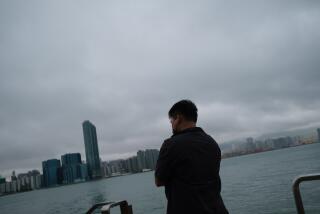Britain Is Turning Its Back, So Hong Kong Transition Needs U.N. Supervision
- Share via
The bloody repression of the pro-democracy movement in China has shown that the Beijing government cannot be trusted and that the joint declaration it signed in 1984 with Britain cannot be relied on to provide the necessary protection against violations of basic human rights when Hong Kong reverts to China in 1997.
China’s assertion that “one country can exist under two systems” has already been disproved by its intolerance of the pro-democracy movement. Furthermore, there are already early warning signs that freedom of speech, freedom of the press and freedom of assembly will be threatened as Hong Kong approaches 1997. This view is supported not only by the events in China, but also by several recent incidents in Hong Kong.
First, two prominent members of Hong Kong’s legislative council and the chairman and vice chairman of the Alliance in Support of Patriotic Democratic Movements in China were severely criticized July 21 by the People’s Daily, the Chinese Communist Party newspaper, and accused of seeking to overthrow the Communist regime. Martin Lee, one of the council members, resigned from the committee drafting Hong Kong’s future constitution in protest of the Beijing massacre and testified before the U.S. Congress several weeks ago. The People’s Daily alleged that “Mr. Lee sneaked into the United States to testify at a hearing of the Human Rights Committee of the U.S. Congress. He appealed to the U.S. to reinforce its economic sanctions on the Chinese government in hopes that the regime in Beijing may be overthrown.”
Attempting to overthrow the Chinese regime is the same accusation leveled at the pro-democracy students in China. The punishment is execution.
The second disturbing event is the firing of Lee Tze-chung, the director of Wen Wei Po, the Chinese newspaper and traditional mouthpiece of the Chinese government, and the subsequent resignation of 30 of its editorial staff in protest, citing gross suppression of press freedom, harassment and forced indoctrination by the Chinese government. Following the June 3 massacre, Lee published articles sympathetic to the pro-democracy movement and critical of the government.
The third item is an article also in the July 21 People’s Daily. It warned Hong Kong that support of China’s pro-democracy movement is equivalent to subversion and sedition, and that continued support of the movement would mean that Hong Kong will not be allowed to continue under its capitalistic system.
These events, among others, are clear signs that serious trouble lies ahead for Hong Kong. What are the prospects for freedom of expression and fundamental human rights in Hong Kong in the face of these blatant examples of inflexibility and intolerance for any views departing from the official Chinese party line?
Meanwhile, Britain has adopted an irresponsible and callous policy toward Hong Kong, adamantly refusing to allow Hong Kong holders of British passports the right to live in Britain. This will be the first time that the dependents of a former colony would be forced to live under communist rule. Britain’s reason for its refusal is that an influx of Hong Kong people would be disruptive to Britain, a conclusion many believe is founded on racism rather than reason. One disillusioned Hong Kong resident remarked, “For Britain, this is not a matter of right or wrong, but White or Wong.”
A report prepared by a group of top English economists headed by Prof. Bernard Corry contradicts the position of the British government. The report concludes that the Hong Kong Chinese would benefit Britain by bringing skills that are in short supply in England, stimulating investments and exports, helping to revitalize deteriorating inner cities and potentially creating a housing boom.
These recent events make it essential that a monitoring group of the United Nations be formed to provide some measure of supervision over the transition of Hong Kong over to Chinese rule. The United States, as a member state of the United Nations, should initiate a resolution providing for such a monitoring group. Further, to provide a safety net for at least some of the Hong Kong people, Congress should support the bill sponsored by Rep. John Edward Porter (R-Ill.), calling for an increase in the quota for Hong Kong immigrants from 5,000 to 50,000.
The stability, vitality and prosperity of Hong Kong have been achieved through the hard work and dedication of its people during the past 40 years. We should not and cannot allow these achievements to be undermined by the brutal hard-liners of China’s current regime.
More to Read
Sign up for Essential California
The most important California stories and recommendations in your inbox every morning.
You may occasionally receive promotional content from the Los Angeles Times.










